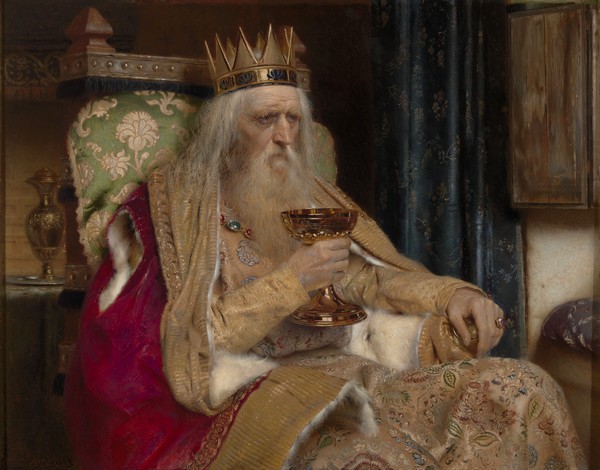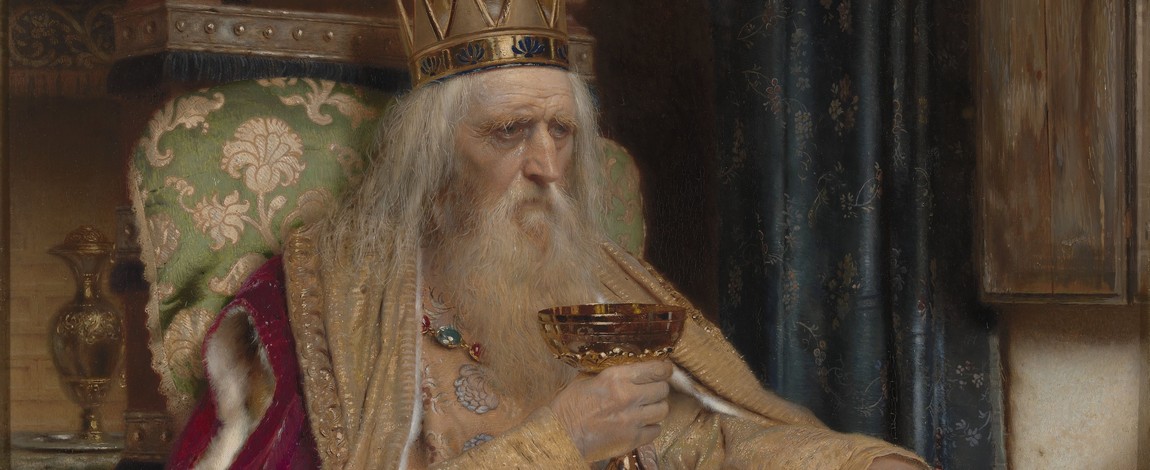
I could have done the article scheduled for this week in a hurry, but I'd rather take my time and instead publish a short one from the series The same poem, one more song.
On this occasion, the poem is the one that begins with the words “Es war ein König in Thule”. Goethe wrote it in 1774 and “recovered” it in 1808 to include it in his Faust, this time a ballad sung by Gretchen. I told you about it a few years ago in some detail, when we listened to Der König in Thule, the song Franz Schubert made upon these verses; I will briefly tell you the story to give you some context. The most precious asset of the king of Thule is a golden goblet, which his beloved gave him before she died; when he feels that the time has come, he gathers his court and distributes all his inheritance, except the goblet, which he throws to the sea before he dies.
This week I propose that we listen to the song written by Franz Liszt with Goethe's poem, Der König von Thule, composed in 1842 and revised in 1856; contrary to other revisions, in this case the two versions are very similar, and we will listen to the second ond, the most recorded.
At first, while the narrator places us in the story, Der König von Thule seems like a strophic song (just as Schubert's): the second stanza is essentially equal to the first. When we are told of the king's imminent death in the third stanza, everything changes: in the first two verses, the melody takes the motif of the piano that we are hearing since the beginning of the song, while in the last two, the memory of the golden goblet sweetens the music.
The end of the third stanza anticipates the fourth stanza, the royal banquet, accompanied by fanfares and all the pomp that the situation requires. We then hear the piano motif, now accelerated, in an interlude that prepares us for what the narrator will tell us in the fifth stanza; Liszt has completely caught us. We are approaching the end: the first two verses of the sixth stanza still seem part of the fifth, and we can practically see how the cup sinks into the sea. In the last two verses, we recover a slower version of the melody from the beginning, and the piano gives us a few moments to recover the breath.
Liszt was not particularly fond of ballads, and he only composed four of them. Still, with Der König von Thule, he achieved an exciting and moving story that we are listening to in the great performance of Konstantin Krimmel and Daniel Heide. I hope you enjoy it and that you will also listen to Schubert's beautiful (and difficult) song again.
Es war ein König in Thule,
Gar treu bis an das Grab,
Dem sterbend seine Buhle
Einen goldnen Becher gab.
Es ging ihm nichts darüber,
Er leert’ ihn jeden Schmaus;
Die Augen gingen ihm über,
So oft er trank daraus.
Und als er kam zu sterben,
Zählt’ er seine Städt’ im Reich,
Gönnt’ alles seinem Erben,
Den Becher nicht zugleich.
Er saß beim Königsmahle,
Die Ritter um ihn her,
Auf hohem Vätersaale,
Dort auf dem Schloß am Meer.
Dort stand der alte Zecher,
Trank letzte Lebensglut,
Und warf den heil’gen Becher
Hinunter in die Flut.
Er sah ihn stürzen, trinken
Und sinken tief ins Meer.
Die Augen täten ihm sinken
Trank nie einen Tropfen mehr.
There was a King of Thule,
faithful to the grave,
to whom his dying beloved
gave a golden goblet.
Nothing was more valuable to him:
he drained it in every feast;
and his eyes would overflow
whenever he drank from it.
And when he neared death,
he counted the cities of his realm
and left everything gladly to his heir -
except for the goblet.
He sat at his kingly feast,
his knights about him,
in the lofty hall of ancestors,
there in the castle by the sea.
There, the old wine-lover stood,
took a last draught of life's fire,
and hurled the sacred goblet
down into the waters.
He watched it plunge, fill up,
and sink deep into the sea.
His eyes then sank closed
and he drank not one drop more.
(translation by Emily Ezust)















Comments powered by CComment